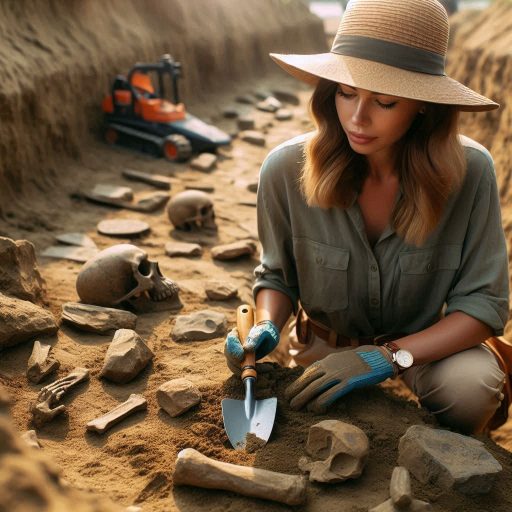Introduction
Cultural anthropology is the study of human societies and their diverse cultures.
This branch of anthropology examines the beliefs, practices, rituals, and social structures that shape human behavior across different communities.
By exploring how people interact with their environments and each other, cultural anthropologists uncover the intricate tapestry of human experience.
Understanding human societies is crucial in our increasingly globalized world.
As cultures intermingle and influence one another, recognizing the value of diverse perspectives becomes more important.
Knowledge of cultural anthropology fosters empathy, tolerance, and a deeper appreciation for the complexities of human life.
This understanding can help us navigate cultural differences and address global challenges with greater awareness.
In this discussion, we will explore key points, including the significance of cultural anthropology in promoting social cohesion, the impact of cultural practices on individual identities, and the role of cultural anthropologists in documenting and preserving cultural heritage.
By delving into these topics, we can appreciate the richness of human societies and the importance of cultural diversity in our world.
What is Cultural Anthropology?
Definition of Cultural Anthropology
Cultural anthropology is a branch of anthropology that studies human societies and cultures.
It examines how people live, interact, and develop within various cultural contexts.
This field focuses on understanding the beliefs, practices, and values that shape different communities.
Cultural anthropologists analyze how culture influences human behavior and social structures.
Focus on Studying Human Societies and Cultures
At its core, cultural anthropology seeks to appreciate the diversity of human experiences.
It aims to understand the complexities of cultural practices around the world.
This discipline emphasizes that culture is learned, shared, and passed down through generations.
Cultural anthropologists recognize that every society has unique customs and traditions.
One primary goal of cultural anthropology is to promote cultural relativism.
This concept encourages researchers to understand cultures within their own contexts rather than imposing external judgments.
Cultural anthropologists advocate for viewing cultural practices as meaningful to those who practice them.
Methods Used in Cultural Anthropology Research
Cultural anthropology employs various research methods to gather information.
One common technique is participant observation, where anthropologists immerse themselves in a community.
This method allows researchers to experience daily life and understand cultural nuances firsthand.
By participating in rituals and events, anthropologists gain valuable insights.
Interviews are another critical method in cultural anthropology.
Researchers conduct structured or unstructured interviews with community members.
These conversations provide a deeper understanding of individual perspectives and social dynamics.
Interviewing helps anthropologists uncover the meanings behind cultural practices.
Fieldwork plays a significant role in cultural anthropology research.
Anthropologists often spend extended periods living within the communities they study.
This immersive approach allows them to build trust and rapport with participants.
Trust enables more honest and open communication about sensitive topics.
Cultural anthropologists also analyze artifacts and material culture.
By examining tools, clothing, and art, they gain insights into the values and priorities of a society.
These objects reveal information about technology, economy, and social organization.
In addition to qualitative methods, cultural anthropology may use quantitative techniques.
Surveys and statistical analyses help anthropologists gather data on larger populations.
This mixed-method approach provides a more comprehensive view of cultural phenomena.
Cultural anthropology contributes to a broader understanding of human societies.
It helps address global challenges by fostering cross-cultural dialogue.
By appreciating cultural diversity, we can promote empathy and cooperation among communities.
In essence, cultural anthropology is the study of human societies and cultures.
It employs diverse methods, including participant observation and interviews.
Through these techniques, cultural anthropologists strive to understand the complexities of human life.
Their work highlights the importance of cultural understanding in a rapidly changing world.
Read: Preparing for a Botany PhD: Tips and Advice
Evolution of Cultural Anthropology
Historical Overview of the Field
Cultural anthropology has evolved significantly since its inception in the late 19th century.
Early anthropologists focused on documenting and classifying cultures, often viewing them through a colonial lens.
The field emerged from the broader discipline of anthropology, which originally encompassed archaeology, linguistics, and physical anthropology.
Early cultural anthropologists sought to understand ‘primitive‘ societies, emphasizing the differences between Western and non-Western cultures.
As the 20th century progressed, cultural anthropology shifted towards a more holistic understanding of cultures.
Researchers began emphasizing the importance of participant observation and fieldwork.
This change allowed for deeper insights into social practices and everyday life.
Prominent figures like Franz Boas challenged existing stereotypes about cultures, advocating for cultural relativism.
This approach emphasized that cultures should be understood based on their own contexts.
Contributions of Key Anthropologists
Several key anthropologists have made significant contributions to the evolution of cultural anthropology.
Franz Boas, often regarded as the father of American anthropology, laid the groundwork for modern cultural studies.
His work emphasized the importance of empirical research and cultural relativism.
He argued that cultures develop uniquely based on their histories and environments.
Margaret Mead, another influential figure, studied the role of culture in shaping personality and gender roles.
Her fieldwork in Samoa challenged Western notions of adolescence, highlighting cultural influences on behavior.
Mead’s findings contributed to discussions on gender and sexuality, expanding the scope of cultural anthropology.
Claude L‘vi-Strauss introduced structuralism, focusing on the underlying patterns of human thought across cultures.
His work analyzed myths, kinship, and social organization, influencing various disciplines beyond anthropology.
L‘vi-Strauss‘s theories encouraged anthropologists to look for universal structures within diverse cultures.
Impact of Cultural Anthropology on Society
Cultural anthropology has had a profound impact on society by promoting cross-cultural understanding.
It has highlighted the importance of respecting cultural diversity, leading to greater tolerance and empathy.
By studying various societies, cultural anthropologists have helped debunk stereotypes and challenged ethnocentric views.
The field has also influenced social policy and development practices.
Insights from cultural anthropology inform initiatives in education, health, and community development.
Policymakers use anthropological research to design programs that respect local cultures and practices.
This ensures that interventions are culturally appropriate and effective.
Moreover, cultural anthropology plays a crucial role in addressing global issues.
It fosters dialogue around topics such as globalization, migration, and human rights.
By analyzing how cultures adapt to change, cultural anthropologists provide valuable perspectives on contemporary challenges.
In short, the evolution of cultural anthropology reflects a growing understanding of human societies.
Key figures have shaped the field through their innovative ideas and research methods.
The discipline continues to impact society by promoting cultural awareness and informing social policies.
Cultural anthropology remains essential for fostering understanding in an increasingly interconnected world.
Read: Interdisciplinary Research: Botany and Other Sciences
Cultural Relativism in Anthropology
Explanation of Cultural Relativism
Cultural relativism is a key principle in anthropology that promotes understanding cultures on their own terms.
It emphasizes that no culture is superior to another.
Instead of judging cultures based on external standards, anthropologists aim to appreciate the unique practices, beliefs, and values of each society.
This perspective allows for a more nuanced understanding of human behavior and cultural diversity.
Cultural relativism arose as a response to ethnocentrism, the belief that one‘s own culture is the standard by which all others should be measured.
Ethnocentrism often leads to misunderstandings and stereotypes about other cultures.
By adopting a culturally relativistic approach, anthropologists strive to combat these biases and promote empathy.
Importance of Understanding Cultural Context
Understanding cultural context is essential for interpreting human behavior accurately.
Cultural practices are often deeply rooted in historical, social, and environmental factors.
What may seem strange or irrational from an outsider‘s perspective can hold significant meaning within its cultural context.
By acknowledging these contexts, anthropologists can better explain and understand cultural phenomena.
Cultural relativism also encourages respect for diverse ways of life.
It promotes the idea that cultural practices, even if they differ from one‘s own, deserve to be respected and understood.
This respect fosters greater intercultural dialogue and cooperation in an increasingly globalized world.
Examples of Cultural Relativism in Practice
Numerous examples illustrate cultural relativism in practice.
One notable case is the practice of arranged marriages in various cultures.
While some may view arranged marriages as outdated or oppressive, they are often seen as a way to strengthen family ties and ensure compatibility.
Understanding the cultural significance behind arranged marriages highlights the importance of family and community values in different societies.
Another example is the varying perceptions of beauty and body image across cultures.
In some cultures, larger body sizes are considered a sign of wealth and health, while in others, slimness is idealized.
Cultural relativism allows anthropologists to analyze these differing standards without imposing their biases, promoting a deeper understanding of the cultural meanings associated with body image.
The practice of polygamy is also often examined through the lens of cultural relativism.
In societies where polygamy is common, it can serve various social and economic purposes.
Understanding the cultural context surrounding polygamy helps anthropologists explore its role within those communities, avoiding judgment based on outside cultural norms.
Cultural relativism is a foundational concept in anthropology that promotes understanding and respect for cultural diversity.
By emphasizing the importance of cultural context, anthropologists can provide nuanced insights into human behavior.
Real-world examples demonstrate how cultural relativism allows for a deeper appreciation of practices that may initially seem unfamiliar.
This approach fosters empathy and dialogue in a multicultural world.
Read: Women in Botany: Celebrating Pioneers and Leaders

Key Concepts in Cultural Anthropology
Culture and Its Components
Culture is the foundational concept in cultural anthropology.
It encompasses the shared beliefs, values, customs, and behaviors of a group.
Culture shapes how individuals perceive the world and interact with one another.
Several key components make up culture, including language, norms, values, and material artifacts.
Language is a crucial component of culture.
It allows people to communicate, express ideas, and share experiences.
Through language, cultures transmit knowledge, traditions, and social norms across generations.
Norms are the unwritten rules that govern behavior in a society.
They guide acceptable conduct and establish social expectations.
Values represent the core beliefs that a culture holds dear.
They influence decision-making and moral judgments within a society.
Material artifacts, such as tools, clothing, and art, reflect cultural practices and priorities.
Together, these components create a rich tapestry of human experience that anthropologists study to understand diverse societies.
Social Organization and Structure
Social organization refers to how a society is structured and how its members relate to one another.
It includes the roles individuals play and the relationships they form within their communities.
Social organization often manifests in family structures, kinship systems, and social hierarchies.
Kinship systems are essential to understanding social organization.
They define relationships based on blood ties, marriage, and adoption.
Different cultures have varying kinship structures, such as nuclear families, extended families, or clan systems.
These systems influence social interactions and obligations, shaping individuals’ identities within the community.
Social hierarchies are another important aspect of social organization.
They define the distribution of power, resources, and status within a society.
Hierarchies can be based on various factors, including age, gender, wealth, and occupation.
Understanding social organization helps anthropologists analyze how societies function and address issues of inequality.
Symbols, Rituals, and Beliefs in Societies
Symbols play a vital role in cultural anthropology, representing ideas and concepts within a culture.
They can be objects, gestures, or words that carry specific meanings.
For example, a flag symbolizes national identity, while religious icons represent spiritual beliefs.
Symbols help individuals navigate their cultural environments and communicate complex ideas.
Rituals are formalized actions that hold cultural significance.
They often mark important life events, such as births, weddings, and funerals.
Rituals can also serve to reinforce social bonds and cultural values.
For instance, communal rituals, like festivals and religious ceremonies, bring people together and strengthen their sense of belonging.
Beliefs are the convictions that individuals hold about the world around them.
They can be religious, philosophical, or cultural in nature.
Beliefs shape how people interpret experiences and make sense of their lives.
Cultural anthropologists study beliefs to understand how they influence behavior and social norms within a society.
Key concepts in cultural anthropology provide a framework for understanding human societies.
Culture encompasses various components, including language, norms, and values.
Social organization reveals the structures and relationships within communities.
Symbols, rituals, and beliefs further illustrate the richness of cultural life.
Together, these concepts help anthropologists analyze and appreciate the diversity of human experiences across the globe.
Read: How Climate Change Is Impacting Plant Research
Fieldwork in Cultural Anthropology
Importance of Fieldwork in Cultural Anthropology
Fieldwork is a fundamental method in cultural anthropology, allowing researchers to study cultures in their natural settings.
This immersive approach enables anthropologists to gain a deeper understanding of the complexities of human behavior and cultural practices.
By engaging directly with communities, anthropologists can observe social interactions, rituals, and daily activities firsthand.
Fieldwork also fosters the establishment of rapport and trust between researchers and participants.
This trust is crucial for obtaining honest and accurate information about cultural practices and beliefs.
Through long-term engagement, anthropologists develop relationships that enhance their understanding of the community’s values and norms.
Ultimately, fieldwork enriches anthropological research, providing insights that cannot be obtained through secondary sources or theoretical analysis alone.
Techniques Used in Fieldwork
Cultural anthropologists employ various techniques during fieldwork to gather data.
One primary method is participant observation, where researchers immerse themselves in the daily lives of the community.
This technique allows anthropologists to experience cultural practices firsthand and gain insights into social dynamics.
Interviews are another essential technique used in fieldwork.
Researchers conduct structured, semi-structured, or unstructured interviews to gather qualitative data from community members.
These conversations provide valuable perspectives on individual experiences, cultural beliefs, and social issues.
Surveys and questionnaires may also be utilized to gather quantitative data from larger populations.
This method can help anthropologists identify trends and patterns within a community.
Additionally, researchers often collect artifacts, photographs, and field notes to supplement their findings.
Challenges and Ethical Considerations in Fieldwork
Conducting fieldwork in cultural anthropology presents various challenges.
One significant challenge is gaining access to communities, especially in sensitive or marginalized groups.
Researchers must navigate cultural barriers and establish trust before collecting data.
This process can take time and requires patience and sensitivity.
Ethical considerations are paramount in cultural anthropology fieldwork.
Anthropologists must prioritize the well-being and rights of their participants.
Informed consent is essential, ensuring that community members understand the research objectives and how their data will be used.
Researchers should respect the privacy and confidentiality of their participants, avoiding harm to individuals or communities.
Additionally, anthropologists must be aware of power dynamics in their relationships with participants.
They should strive to minimize any potential exploitation or misrepresentation of cultural practices.
By approaching fieldwork with ethical sensitivity, anthropologists can contribute to more responsible and respectful research practices.
Fieldwork is a critical component of cultural anthropology, providing valuable insights into human societies.
Through techniques such as participant observation and interviews, researchers gather rich qualitative data.
However, fieldwork also presents challenges and ethical considerations that must be navigated with care.
By prioritizing ethical practices, cultural anthropologists can ensure their work positively impacts the communities they study.
Transform Your Career Today
Unlock a personalized career strategy that drives real results. Get tailored advice and a roadmap designed just for you.
Start NowExplore Further: Epidemiologist Work Environment: Where They Work
Applications of Cultural Anthropology
Role of Cultural Anthropologists in Various Industries
Cultural anthropologists play a crucial role in multiple industries by applying their expertise to address real-world challenges.
In healthcare, they help design culturally sensitive programs that consider patients’ beliefs and practices.
This understanding improves patient outcomes and fosters trust between healthcare providers and communities.
In the field of education, cultural anthropologists contribute to developing curricula that reflect diverse cultural perspectives.
They advocate for inclusive teaching practices that honor students’ backgrounds, enhancing the learning experience.
Additionally, businesses employ cultural anthropologists to understand consumer behavior and preferences.
This insight enables companies to create targeted marketing strategies and improve customer satisfaction.
Moreover, cultural anthropologists are increasingly involved in technology and user experience design.
They study how different cultures interact with technology, ensuring that products and services meet the needs of diverse user groups.
This involvement enhances accessibility and usability in a global market.
Impact of Cultural Anthropology on Policy Making
Cultural anthropology significantly influences policy making by providing insights into the cultural contexts that shape social issues.
Anthropologists conduct research that informs government and non-profit organizations about the needs and perspectives of specific communities.
This knowledge helps policymakers create effective and culturally relevant programs.
For example, cultural anthropologists often engage in research related to social justice, immigration, and public health.
By understanding the cultural factors that impact these areas, anthropologists can recommend policies that promote equity and inclusion.
Their work can lead to more responsive governance and improve the effectiveness of social programs.
Additionally, cultural anthropology aids in disaster response and recovery efforts.
Anthropologists study how communities cope with crises, helping organizations develop strategies that align with local customs and values.
This culturally informed approach enhances community resilience and fosters collaboration among stakeholders.
Cultural Competency in a Globalized World
Cultural competency is increasingly vital in our globalized world.
As societies become more interconnected, understanding and respecting cultural differences is essential for effective communication and collaboration.
Cultural anthropologists promote cultural competency by educating individuals and organizations about the importance of cultural awareness.
In international business, cultural competency is crucial for building successful relationships with clients and partners from diverse backgrounds.
Companies that prioritize cultural understanding can navigate cross-cultural challenges more effectively, leading to better business outcomes.
Training programs led by cultural anthropologists can equip employees with the skills to engage with clients respectfully and knowledgeably.
In education, cultural competency fosters inclusive environments where students from various backgrounds feel valued and understood.
Educators who incorporate cultural awareness into their teaching practices can enhance student engagement and academic success.
This approach prepares students to thrive in an increasingly diverse and interconnected world.
The applications of cultural anthropology extend across various industries and domains.
Cultural anthropologists play vital roles in healthcare, education, business, and policy making, providing insights that inform practices and strategies.
As cultural competency becomes increasingly important, the contributions of cultural anthropology are essential for fostering understanding and collaboration in a globalized society.
Gain More Insights: Biostatistician vs. Statistician: Key Differences
Conclusion
Cultural anthropology plays a vital role in understanding human societies and their complexities.
It explores diverse cultures, traditions, and beliefs that shape our world.
By examining these factors, we gain valuable insights into human behavior and social structures.
Cultural anthropologists study how cultural practices influence everything from family dynamics to economic systems.
They help us appreciate the richness of cultural diversity and foster empathy toward others.
This discipline encourages us to look beyond our immediate experiences and understand different perspectives.
It reveals how cultural norms and values shape our thoughts, actions, and interactions.
Understanding cultural anthropology is essential in today‘s interconnected world, where globalization creates both challenges and opportunities.
This field equips us with the tools to navigate these complexities and embrace diversity.
As we learn about various cultures, we can break down stereotypes and build stronger, more inclusive communities.
Acknowledging and valuing cultural differences leads to enhanced collaboration and mutual respect.
I encourage you to delve deeper into cultural anthropology.
Read books, attend lectures, or participate in community events to enrich your understanding.
Engage with cultural events and discussions to learn from others.
Explore museums and cultural festivals to witness the beauty of diversity firsthand.
Let your curiosity guide your exploration of the fascinating world of cultural anthropology.
This journey can deepen your understanding of human societies and inspire you to appreciate the shared experiences that connect us all.
[E-Books for Sale]
The Big Book of 500 High-Paying Jobs in America: Unlock Your Earning Potential
$19.99 • 500 High-Paying Jobs • 330 pages
Explore 500 high-paying jobs in America and learn how to boost your career, earn more, and achieve success!
See All 500 High-Paying Jobs of this E-Book
1001 Professions Without a Degree: High-Paying American Jobs You Can Start Now
$19.99 • 1001 Professions Without a Degree • 174 pages
Discover 1001 high-paying jobs without a degree! Unlock career tips, skills, and success strategies for just $19.99!




